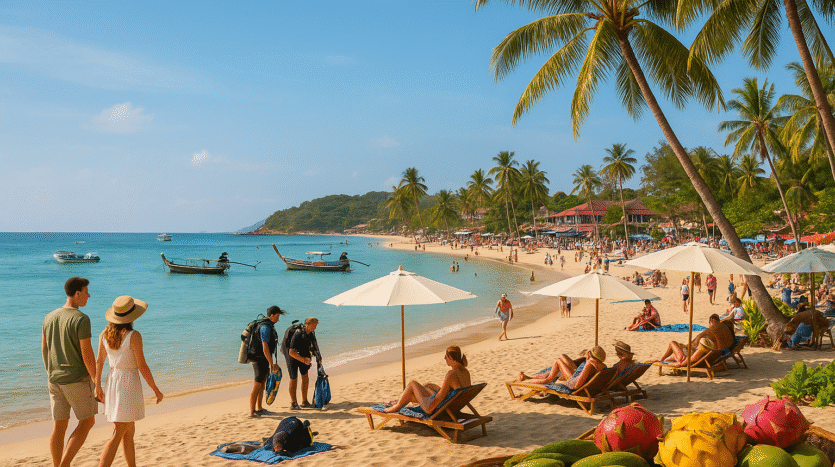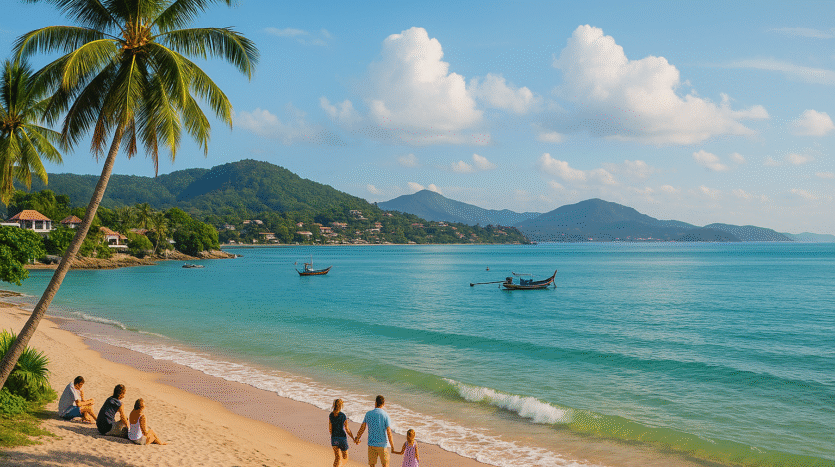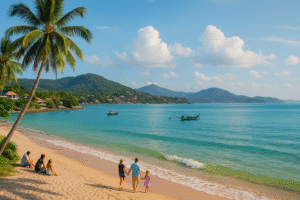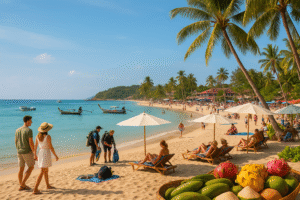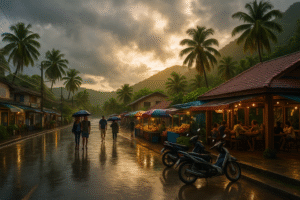Koh Samui Weather: Safe in the Gulf of Thailand’s Tropical Seasons
Koh Samui is often imagined as an endless postcard: golden beaches, turquoise waters, and palm trees swaying in the breeze. But beyond the island’s beauty, there’s another rhythm that defines daily life here—the weather. For visitors and expatriates alike, understanding Koh Samui’s climate is not just practical, it’s essential. The tropical seasons influence everything: when to swim, where to live, how to travel, and even how communities come together.
In this guide, we explore Koh Samui’s unique weather patterns, shaped by its protected location in the Gulf of Thailand, from sun-filled months to refreshing monsoon rains, and share tips on how to embrace the island lifestyle in every season.
A Protected Paradise in the Gulf of Thailand
One of the greatest advantages of Koh Samui’s climate is its geographic protection. Nestled within the Gulf of Thailand, the island is shielded from the strongest winds and rough seas that impact other parts of Southeast Asia, especially the Andaman coast. Unlike regions exposed directly to the Indian Ocean, Samui rarely experiences severe storms or major natural disasters.
This natural barrier not only makes the weather more predictable, but it also gives expats and long-term residents peace of mind. The island is considered safer and more stable year-round, with fewer risks of extreme weather events disrupting daily life. For those considering relocating or investing in property, Koh Samui’s sheltered position is a key reason why it remains such an attractive destination.
The Tropical Climate of Koh Samui
Located in the Gulf of Thailand, Koh Samui benefits from a microclimate that sets it apart from other regions of the country. Unlike Phuket or Krabi, which are heavily affected by the Andaman Sea monsoons, Samui’s weather is often milder and more predictable.
Temperatures remain warm year-round, usually between 26–32°C (79–90°F). The island’s climate can be divided into two main seasons—dry and rainy—each offering its own charm and lifestyle adjustments.
The Dry Season (December – April)
This is the time when Koh Samui truly shines. From December to April, the island enjoys sunny days, calm seas, and refreshing breezes. It’s the perfect season for beach lovers, divers, and anyone who enjoys the outdoors.
-
Lifestyle benefits for expats: This is when the island comes alive with festivals, social gatherings, and high tourist activity. It’s also a peak time for real estate demand, as many people seek long-term stays.
-
Practical tips:
-
Wear light clothing and always carry sunscreen.
-
Plan beach outings and island-hopping trips early in the day.
-
Consider renting or buying property in coastal areas, where breezes keep homes naturally cooler.
-
The dry season is often considered the best time to visit—but it’s also when prices for rentals and services are at their highest.
The Rainy Season (May – November)
When the rains arrive, Koh Samui transforms. The island becomes lush and green, waterfalls flow at their strongest, and the atmosphere feels more tranquil. Contrary to what some expect, the rainy season does not mean endless downpours. Most showers are short and intense, often clearing quickly to reveal blue skies.
-
How locals and expats adapt: Many embrace indoor activities—cafés, yoga, spa days, or coworking hubs. Wellness retreats and cultural experiences are especially popular during these months.
-
Practical advice:
-
Invest in waterproof gear and lightweight rain jackets.
-
Be mindful of scooter travel on wet roads; cars are safer for daily commutes.
-
Choose housing in elevated or well-drained areas to avoid minor flooding.
-
For expats, the rainy season can feel like a more authentic experience, with fewer crowds and a calmer pace of life.
The Best Time to Visit or Settle in Koh Samui
Tourists usually prefer the dry season, but many expats find the rainy season equally appealing. The quieter atmosphere, lower costs, and lush landscapes create a lifestyle that feels more personal and connected to nature.
-
Dry season: Best for social activities, outdoor sports, and exploring beaches.
-
Rainy season: Ideal for those seeking affordability, tranquility, and natural beauty.
When it comes to settling, expats often weigh personal preferences. Families may enjoy the lively dry season, while digital nomads or retirees often embrace the peaceful rainy months.
How Expats Adapt to Tropical Living
Living in Koh Samui means adjusting your daily rhythm to the climate. Morning beach walks, mid-day siestas, and evening market visits become part of the lifestyle. Expats learn to:
-
Shop at fresh markets early in the morning, before the heat peaks.
-
Stay active with gyms, yoga, and indoor hobbies during rainy spells.
-
Organize social gatherings in cafés, coworking spaces, or beachfront restaurants where weather isn’t a concern.
Over time, the seasons stop feeling like challenges—they become part of the island’s charm.
Practical Tips for Living with the Seasons
To make island life easier, here are some essentials every expat should know:
-
Clothing: Light fabrics for the dry season, breathable rain jackets for the wet season.
-
Transport: Scooters are ideal in the dry months, but cars are safer and more practical during heavy rains.
-
Housing: Well-ventilated homes keep cool in summer, while elevated properties reduce flooding risks.
These small adjustments make a big difference in comfort and daily life.
Conclusion: Embracing the Rhythm of the Tropics
The climate of Koh Samui is not something to endure—it’s something to embrace. Each season offers its own beauty, whether it’s sun-soaked afternoons at the beach or the sound of tropical rain falling on lush greenery. For expatriates, living in tune with Koh Samui’s weather means more than adapting—it means thriving. The island’s climate is part of what makes life here unique: a constant reminder that nature sets the pace, and paradise is best enjoyed when you go with the flow.


